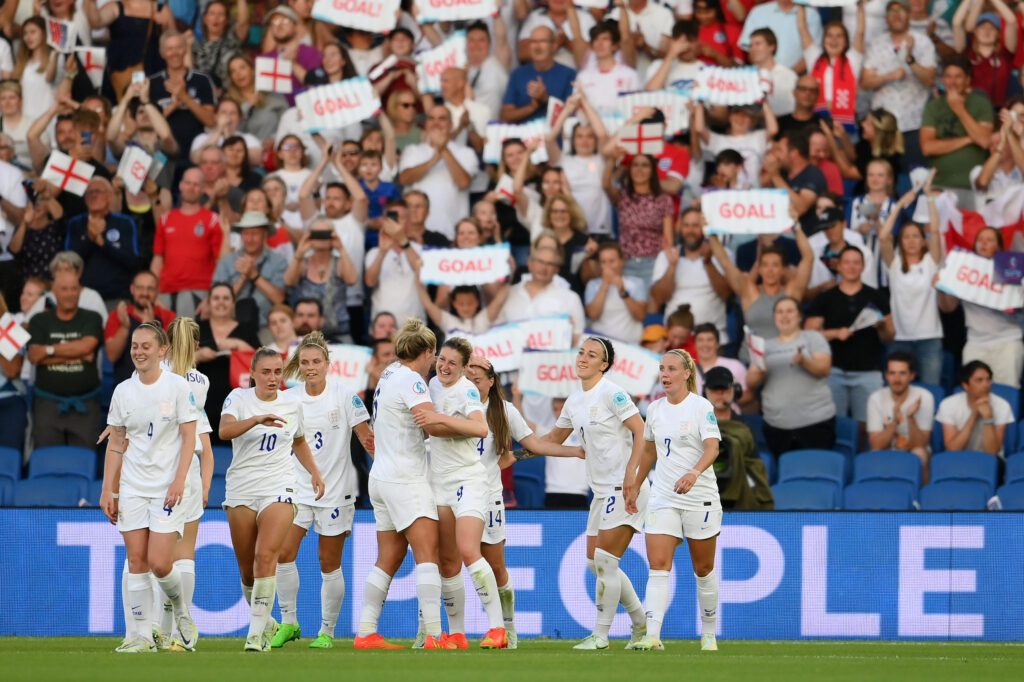For many of its formative years, women’s soccer has been held up as primarily inspirational. Titles won for club and country have been lauded as part of the fight for the next generation of young girls who need to see athletes in women’s sports achieve great things before they push progress along themselves. Even as interest in the present generation of players has risen year after year, the pulse of the sport from the top has been firmly focused on what comes next.
This summer, fans across the world got a glimpse instead at what is happening right now, as record crowds poured in to watch international soccer tournaments on four different continents.
The “little girls of the future” narrative has played out for a long time, and it still got its fair amount of shine during the four major tournaments that concluded with the Euros final on July 31. For the young ones among the 87,192 fans that packed Wembley Stadium for that game, they witnessed an ending for the ages. In a battle between two well-matched sides, England won their first major trophy on home soil, 2-1 in extra time, over a young, disciplined Germany team, and celebrations erupted nationwide.
In the weeks since, England’s Euros win has been compared to the USWNT’s World Cup championship in 1999, with the potential to usher in a brand new era of support for the women’s game. There are certainly some similarities between the two tournaments: home teams, big crowds, media coverage, and a ripped jersey celebration to cap the whole thing off.
But Brandi Chastain, ‘99 penalty kick legend, told Just Women’s Sports just this year that her iconic moment didn’t have the ripple effect off the field that it could have.
“You’re winning big tournaments like the World Cup, and yet you’re anonymous,” she said. “You know that you need to continue to push forward, and you feel that your own group is not taking you as seriously or holding your value the same as they hold someone else’s.”
Such is the cost of inspirational platitudes, when those in charge aren’t ready to fully invest in a future that matches the high expectations of those already striving for perfection on the field. Twenty-three years after the USWNT’s moment, similar emotions have emerged in England, which has a long history of suppressing potential. Women’s football was outlawed in the country that invented the sport from 1921-70. Even now, only 63 percent of girls can play football in PE in England. The scars of institutional neglect still show, even in victory.
Those advocating for women’s football have known this for years, but inspiration is not enough. If there’s one thing the 2022 summer of international soccer has shown us, however, it’s that the age of inspiration might actually be behind us.
Now, it’s time to enter the age of ambition.
Ambition can come in many forms: professional standards, long-term investment, smart hiring and talent identification. It requires real vision and respect toward a sporting sector that is no longer emerging, but has shown quantifiable evidence that it has already arrived. TV ratings for the Euros final were through the roof in multiple countries, hitting 17.4 million in the UK, 17.9 million in Germany, and almost breaking a million viewers in the U.S. The English FA marketed the Women’s Euros at the ground level, and both traditional and new media outlets covered it, giving the final result the weight it deserved at face value.
CHLOE. KELLY. @Chloe_Kelly98 😱#WEURO2022 pic.twitter.com/TgTUvvZJW3
— Just Women’s Sports (@justwsports) July 31, 2022
On the field, that ambition played out in many ways, including in the context of the right coaching hire. England had been building the depth of their program for years, helped in large part by the growing competitive cauldron of the Women’s Super League. But the years spent with Phil Neville as manager from 2018-21 never set the team on the trajectory that matched the expectations being placed on them. Neville was not a student of the women’s game when he was hired, nor did it seem like he tactically understood the elements of cohesion and chemistry required to peak at the right time.
When the pandemic delayed the Euros by a year, Neville stepped away from the team to take a job in MLS, and the FA hired the best woman for the job: Sarina Wiegman. Wiegman led the Netherlands to the 2017 Euros title and the final of the 2019 World Cup, and she proved to be the right manager for a deep England squad that showed 100 percent buy-in. In every match, even when facing moments of adversity, the Lionesses showed a confidence that we’d never seen from them on this big a stage before.
Other nations full of footballing talent have not always had that same sense of urgency. Most dramatically, Nigeria had to boycott training prior to their Women’s Africa Cup of Nations third-place game against Zambia in order to be paid wages they’d been promised. Coaches Jorge Vilda in Spain and Corinne Diacre in France received contract extensions through 2024, despite questions surrounding the management of their squads. Mexico’s World Cup qualifying failure at home led to a round of firings, but Concacaf’s lack of desire to properly market the women’s game went far beyond the host country, leaving a massive opportunity on the table.
It would also be remiss to act like the positive sea change is only occurring in Europe.
The WAFCON tournament in Morocco proved a rousing success for the host nation, as they qualified for the World Cup for the first time in a runners-up performance to South Africa. Copa America Femenina host Colombia has also made their return to the world stage, in a similarly successful run to second place against perennial winners Brazil. Brazil, more than three years removed from Marta’s teary-eyed plea to the next generation at the 2019 World Cup, is successfully going through their own generational shift.
In the United States, the new level of ambition worldwide is sometimes framed as a threat, but as NWSL commissioner Jessica Berman told reporters in Chicago this past weekend, it’s also an opportunity. She attended the final knockout rounds of the Euros and also participated in the World Leagues Forum — the first iteration of a women’s professional league counterpart to the annual men’s summit.
“[The Euros] reminded me of how I felt watching the Angel City home opener, where people were really there to watch the soccer, and people were really there because the sport was taking over,” Berman said. “And the fact that it was women’s soccer was just a bonus. It really wasn’t about a social statement or anything like that. It was really more like, this is the sport at its best globally.”
For two days in London, each league presented to the group what they currently consider their unique value proposition. They also shared best practices and, as Berman put it, “really [had] a discussion about how we can work in tandem to make this a global movement.” The NWSL has unique challenges and strengths in the global market as a non-men’s league-affiliated property, and the best approach for the four-time World Cup-winning nation has to be to meet the rising tide head on.
With the established success of Barcelona and Real Madrid, growing interest in the German Frauen Bundesliga, Lyon and PSG’s dominance in France, and a whole host of English WSL clubs poised to pounce on the Euros momentum, the NWSL has to have a clearer vision than what we saw in the league’s first 10 years. Internationally, the USWNT should always invite the opportunity to play other teams at their best. We’ve seen that this month with the scheduling of a friendly against England at Wembley in October, which was clearly in the works before the final Euros whistle blew.
More than anything, this summer presented enough evidence that if there was ever a time for a new golden era of the sport, it’s not for the girls of the future — it’s actually right now. Players have been ready for this opportunity for a long time, as have fans. It’s time for the rest of the world to catch up.
Claire Watkins is a contributing writer at Just Women’s Sports covering soccer and the NWSL. Follow her on Twitter @ScoutRipley.

